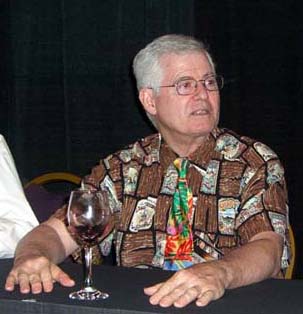Here are some interesting tidbits that were said at the kaffeeklatsch with the editor-legend David Hartwell.
A lot of people have very different opinions as to what hard science fiction means. Some count J. G. Ballard amont the writers working in this subgenre. In fact, J. G. Ballard had once stood up and said he was a hard science fiction writer: the hard science within which he was working were medicine and psychology. He may have had a point, because he was trained as a doctor, and he used those sciences rigorously in his fiction.

David Hartwell at the opening ceremony of ApolloCon 2007
About the economics of book sales. Apparently, mainstream books sell much worse than genre books. Of all 5 books nominated to the National Book award one year, none of them sold even a 1000 copies. Meanwhile it's a rare SF hardback that doesn't sell at least 2000 copies. Hartwell quotes Norman Spinrad, who said that publishing a SF novel that's a complete failure would be as unlikely as constipating yourself by active will.
Hartwell juggled some numbers, converting word count into dollars. For example, an extra 20,000 words translate into extra $2 added to the price of a hardcover. So if a 120,000 word hardcover would cost $24.95, a 140,000 hardcover would cost 26.95; and that means bookstores would order 25% fewer copies of it. (Or something like that. I'm not sure I am quoting those numbers right.) He shed light on the complex relationship between book distributors and publishing houses; a major portion of books are sold through supermarkets and other superstores, and if a superstore stops buying books from a publishing house, that publishing house may go bankrupt. Basically, he said, most books are now sold through superstores rather than small bookstores, which means that most of America lives 40 - 60 miles from a bookstore.
Hartwell says one of the best things one can do to promote the genre of science fiction, to keep it alive and thriving, is to write book reviews, an publish them somewhere. No matter how obscure is a web site where it's published, someone will find it and read it. It's especially true when you are reviewing an author's first novel. Even if the review is negative, if it is engaging and well thought-out, it will do a lot to promote the new author. 500 -- 1000 word review is better than a 300 word review. A 1500 word review is even better.
I feel so validated! My verbose book reviews are therefore worthwhile -- at least in Hartwell's opinion!
No comments:
Post a Comment